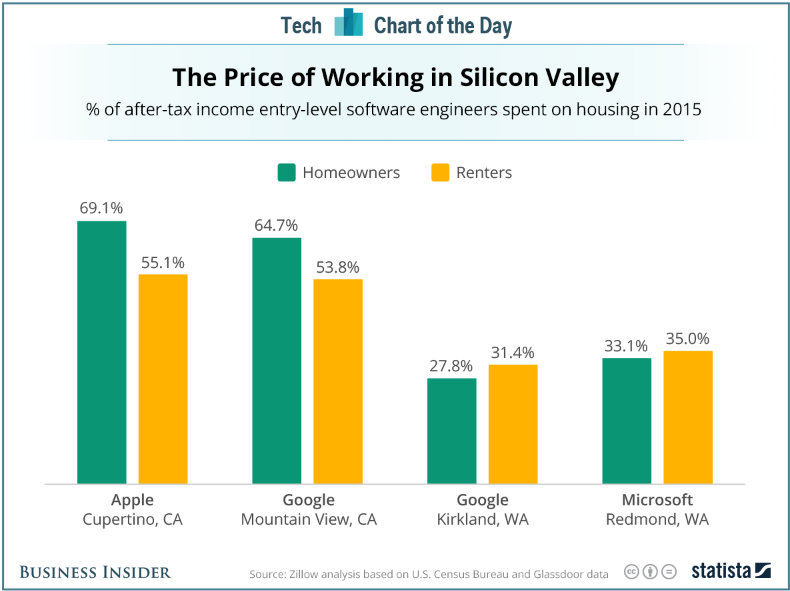You might have seen this chart recently over at Business Insider:
 We all probably got this. It costs a TON to live in San Fransico! Way too much. You’re crazy if you want to start a tech company in San Fran. So, what do all those super smart folks do? Yeah, stay west coast and just go a bit more north to Seattle, still expensive, but seemingly cheap in comparison to San Fransico!
We all probably got this. It costs a TON to live in San Fransico! Way too much. You’re crazy if you want to start a tech company in San Fran. So, what do all those super smart folks do? Yeah, stay west coast and just go a bit more north to Seattle, still expensive, but seemingly cheap in comparison to San Fransico!
It’s one of the main reasons Austin, TX became a hotbed of tech startups and headquarters about a decade ago. Relatively cheap to place to live. Access to a major university (Univ. of Texas), which gives you young, talented, tech savvy folks. Nice weather.
Here’s the magical formula to picking a place to house your tech company:
- Access to talent.
- Place people want to live.
- Good weather.
- Hip vibe.
- Affordable. (not necessarily an important factor – but increasing in importance!)
Give this magical formula, I’ll give you the number 1 destination of new tech startups!
DETROIT!!!!
Well, actually it’s Ann Arbor, which is about a 15-minute drive from Detroit’s International Airport, a Delta hub and one of the nicest airports around. Which means direct flights to almost everywhere. Home to the University of Michigan and great talent pipeline (Michigan State is also 50 minutes away). So, you have two Giant universities and roughly 80,000 students within easy driving distance. A ton of other smaller universities within a 50-mile radius as well (Eastern Michigan, Wayne State, Oakland Univ., Univ. of Toledo, etc.).
It’s super cheap to live. Ann Arbor is a great college city, with access to the bigger Metro Detroit area within a thirty-minute drive. Access to someone of the world’s largest freshwater lakes. Toronto is an easy, cheap flight, or 4-hour drive away.
Okay, you won’t get super nice weather. You’ll get four seasons, midwestern work ethic and so much more for your money you won’t understand why anyone ever went west to begin with!
Oh, I hear you. What about the talent? The Detroit Metro Area is one of the world’s largest engineering centers in the world! You know about all the auto companies, but what you don’t know is that Google has been growing an empire in Ann Arbor for years, and doing it quietly because they don’t want others hoarding in on the secret!
So, yeah, Seattle is way cheaper than San Fransico. You only have to pay 35% of pay towards rent. In Detroit, you only have to pay about 15% of your pay towards rent!
Detroit! The new San Fransico! We even have a bridge!
